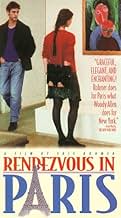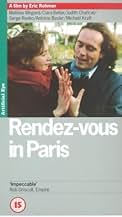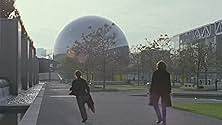Les rendez-vous de Paris
- 1995
- Tous publics
- 1h 38m
IMDb RATING
7.2/10
2.7K
YOUR RATING
Three stories of love and coincidence around the theme of dates in Paris.Three stories of love and coincidence around the theme of dates in Paris.Three stories of love and coincidence around the theme of dates in Paris.
- Awards
- 2 nominations total
- Director
- Writer
- All cast & crew
- Production, box office & more at IMDbPro
Featured reviews
A nice Rohmer film. Fans of his work will like it a lot, and it's not likely to win over any non-lovers or even newbies. I'm a big fan myself, so it won me over effortlessly. I'd rank it lower than most of the Rohmer films that I've seen, but, then again, I've never disliked one of his films and most of them I absolutely adore. Rendezvous in Paris is made up of three short stories about near-affairs in Paris. The first, "Rendezvous at 7 O'clock," is about a young woman who finds out that her boyfriend sees other women. Through a set of amazing circumstances, she meets his other girlfriend. The second, "The Benches of Paris," is the best. It is about a teacher who is trying to seduce a young woman whose relationship with her longtime boyfriend seems to be on the rocks. We watch them as they walk around the parks and other scenic areas of the French capital. The third, "Mother and Son 1907," is about a pretentious painter who comes up with elaborate philosophies about his love life. He is set to spend the weekend with a Swedish girl, a cousin of a friend, but, when he runs into a beautiful, young, and married girl outside of the Picasso Museum, he has to run after her. The acting is great, especially Aurore Rauscher, the woman in the second section of the film. Rohmer paints these relationships so perfectly; they seem so simple, but they are rife with complexities. Contemplating them makes my head swirl. 8/10.
Not one of Rohmer's best works, Rendezvous in Paris lacks the passion, the seduction as well as the lust that is found in most of his films. Set in 3 Acts, the story has a mixture of pre-Seinfeld coincidences that interlock the three stories together. Since the connections are not profound or at least comical, the audience is doomed to lose interest in not only the story line but also the characters involved. Most of the characters on screen are only present for around twenty minutes, this does not give the audience enough time to connect or care about the circumstances that they are involved in. The only saving grace the movie has is its moral (or lack of one) involving glimpses of relationships and the need, or want or fear of adultery. In Act 1, we witness when adultery goes wrong. Act 2, the fear of getting caught, and finally we see the need and interest in committing adultery. Other than that, the story lacks much of what is needed for a successful movie. Which includes, filming permits. A great drinking game while watching this movie is to drink every time you see someone in the background look at the camera. This was not only obvious throughout the story, it reminded you that you were watching a movie.
All three tales here reference romance, if in very different ways, and Paris is generously used, including some little known spots. The dynamic between young men and women is credibly yet delicately drawn, with more than a touch of understated humor along the way. The whole film has a slight sense of an exercise in style such as the Coen brothers sometimes undertake. It is very French in its verbal examination of ideas and relationships: "I never date painters, I like paintings too much"; "Picasso is never Picasso, that is what makes him Picasso". A gentle social satire runs through much of it along with an indulgent view of youth - one very much feels that all these people will view life very differently a decade later. But for now they're young, and thinking a little too profoundly, and flirting far too easily, and yes playing a few games. Those who are like them, or remember when they were, will smile and happily follow them as they form light memories to look back on from a weightier future.
Eric Rohmer's Les rendez-vous de Paris brought back so many memories from my first summer in Paris, at the age of twenty-six. In my experience, the place was teeming with dragueuers, and the scenes and locales of this film are all familiar, reminding me of how intrinsically social French society is.
I have to wonder how Parisians are faring through the Coronapocalypse. No more double and quadruple social kissing, Je suppose. C'est triste, un peu. I cannot really imagine Paris filled with masked people moving to the other side of the street upon sighting another person. And yet, here we are. I hope that Paris recovers.
I have to wonder how Parisians are faring through the Coronapocalypse. No more double and quadruple social kissing, Je suppose. C'est triste, un peu. I cannot really imagine Paris filled with masked people moving to the other side of the street upon sighting another person. And yet, here we are. I hope that Paris recovers.
What is love? and can you explain it. Using three meetings at different locations , Rohmer creates a parable on the intricate and surprising nature of love. The first story about a rendezvous at seven is the best. Insidious in its nature, it plants the seeds of doubt that blossom into the tale of two women and two men, each seeking and expecting divergent results. Filled with coincidences, all three tales are, it presents the surprises we don't see coming.
The second story which is kind of dull or more demanding depending on taste, follows a couple meeting up in many public locations. The female character is afraid to meet in private despite the urgings of her male lover and when she does make the leap, the consequences will forever change the relationship.
The goat of the pack is the final vignette, a story titled after a Picasso painting that features prominently in story. Again the obvious is pushed aside for the unexpected and there is a certain breezy, plush ending to the proceedings that seems to jar with what has become.
A comedy in three parts, there is a chorus group that is interspersed and opens each story. Cherubic in nature, the songs present certain adages on the nature of love and life.
A mixture of his moral tales with his comedies and proverb series, it is the lesser of each but sub-par Rohmer is still superior to most filmmakers. His low frills style of film making which a previous reviewer called cheap tells him how little he knows about the edict of the French New wave, the only die-hard adherent remained Rohmer, his rules, a quantifier closer to the Dogma'95 tradition of cinema. It is cinema of the heart at its finest.
The second story which is kind of dull or more demanding depending on taste, follows a couple meeting up in many public locations. The female character is afraid to meet in private despite the urgings of her male lover and when she does make the leap, the consequences will forever change the relationship.
The goat of the pack is the final vignette, a story titled after a Picasso painting that features prominently in story. Again the obvious is pushed aside for the unexpected and there is a certain breezy, plush ending to the proceedings that seems to jar with what has become.
A comedy in three parts, there is a chorus group that is interspersed and opens each story. Cherubic in nature, the songs present certain adages on the nature of love and life.
A mixture of his moral tales with his comedies and proverb series, it is the lesser of each but sub-par Rohmer is still superior to most filmmakers. His low frills style of film making which a previous reviewer called cheap tells him how little he knows about the edict of the French New wave, the only die-hard adherent remained Rohmer, his rules, a quantifier closer to the Dogma'95 tradition of cinema. It is cinema of the heart at its finest.
Did you know
- TriviaWhile at the Cimetiere St. Vincent, they visit the grave of Theophile Alexandre Steinlen who was a Swiss-born French Art Nouveau painter and print-maker.
- How long is Rendez-vous in Paris?Powered by Alexa
Details
Box office
- Gross US & Canada
- $730,099
- Opening weekend US & Canada
- $36,471
- Aug 11, 1996
- Runtime1 hour 38 minutes
- Color
- Aspect ratio
- 1.37 : 1
Contribute to this page
Suggest an edit or add missing content

Top Gap
By what name was Les rendez-vous de Paris (1995) officially released in India in English?
Answer




















